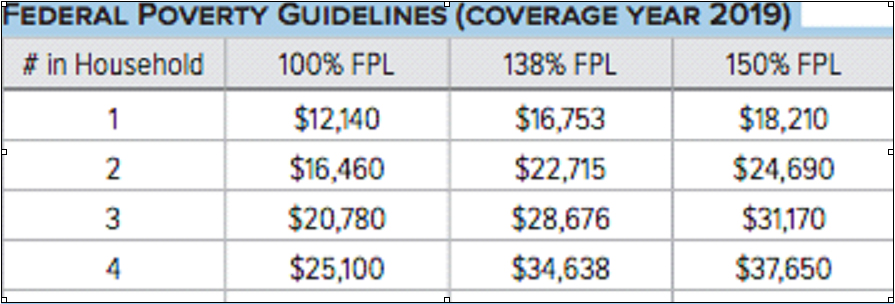
Why SB 96 hurts Utah
By Jennifer Stanga
In the November 2018 elections, 53.32 percent of Utah voters approved of the expansion of the state’s Medicaid program through Proposition 3. Under the guidelines of Proposition 3, the umbrella for Medicaid coverage would expand to an estimated 150,000 Utahns. The qualifications would require a person to be under the age of 65 and have income that is less than or equal to the Federal Poverty Line of 138 percent. The poverty rate in 2019 is $16,643 or less for individuals and $33, 948 or less for a household of four. The extra funding that would be needed in order to support this expansion would be provided by two main sources. The federal government (via the Affordable Care Act) would provide 90 percent of the funding for this extension. The remaining 10 percent would be provided by a 0.15 percent increase in state sales tax.
Although Utah voters approved of the Medicaid expansion at the 138 percent Federal Poverty Line, the Utah legislation created an alternative bill that would only cover a partial expansion. Senate Bill 96 provides additional barriers to access care. The most notable change of SB 96 was the reduction in qualifications to enroll in Medicaid from a Federal Poverty Line of 18 percent (according to the ACA guidelines) to a Federal Poverty Line of 100 percent. Federal Poverty Line guidelines for the coverage year 2019 (see Table 1) show that the difference for a family of four would have to make $25,100 a year or less to qualify for Medicaid under the partial expansion, which is a $9,538 difference in annual income. SB 96 entails additional restrictions and requirements to qualify for Medicaid including work, volunteer, and/or education requirements. This includes working over 30 hours per week or having a combination of work and consistent volunteering that comes to a total of 30 hours per week.
 Even if an individual or family meet all the requirements within the partial expansion’s criteria, SB 96 has a cap on the number of qualifying Utahns depending on the state’s determination of fiscal availability. This modified partial Medicaid expansion serves 48,000 fewer Utahns than Proposition 3’s use of the ACA guidelines.
Even if an individual or family meet all the requirements within the partial expansion’s criteria, SB 96 has a cap on the number of qualifying Utahns depending on the state’s determination of fiscal availability. This modified partial Medicaid expansion serves 48,000 fewer Utahns than Proposition 3’s use of the ACA guidelines.
A part of the stipulation of SB 96 was qualifying patients to submit an 1115 Waiver, also called the Per Capita Cap Plan. This waiver intends to request that Utah adults that meet the partial expansion’s requirements would receive full coverage through Utah’s Medicaid. According to the Utah Medicaid Expansion, the waiver would request the 90 percent fiscal coverage from the ACA, with Utah being responsible for the remaining 10 percent of funding sources. SB 96 does not include how Utah will supplement for that 10 percent of the costs.
Utahns who do not participate in the Medicaid program are also negatively impacted by SB 96. Research shows that the costs of unhealthy residents outweigh the costs of providing Medicaid. While SB 96 does remove the supplement of funding sources from an increased sales tax, the long-term fiscal damage to the state’s economy would outweigh the slight tax increase. This coverage gap would cost the state of Utah $50 million more over the next two years. This will become indefinite until the federal government approves of the Per Capita Cap Plan. As of this writing, the ACA explicitly states that the 90 percent federal match rate would be applicable if the state agrees to cover the entire expansion eligibility outlined in the ACA. Furthermore, the reduced eligible population under SB 96 would cost the state the same amount of state resources.
Governor Gary Herbert commented that SB 96 “balances Utah’s sense of compassion and frugality. It provides quality coverage to the same population covered by Proposition 3 in a meaningful, humane, and sustainable way.” However, the “population” that he is referring to has been cut into a third due to the high qualifications that SB 96 requires. The expansion of Medicaid is essential for all Americans. It is fiscally responsible as well as necessary for the overall well being of our communities and the future of Utah.
The viewpoints expressed above are those of the author and do not necessarily reflect those of The Independent.
How to submit an article, guest opinion piece, or letter to the editor to The Independent
Do you have something to say? Want your voice to be heard by thousands of readers? Send The Independent your letter to the editor or guest opinion piece. All submissions will be considered for publication by our editorial staff. If your letter or editorial is accepted, it will run on suindependent.com, and we’ll promote it through all of our social media channels. We may even decide to include it in our monthly print edition. Just follow our simple submission guidelines and make your voice heard:
—Submissions should be between 300 and 1,500 words.
—Submissions must be sent to editor@infowest.com as a .doc, .docx, .txt, or .rtf file.
—The subject line of the email containing your submission should read “Letter to the editor.”
—Attach your name to both the email and the document file (we don’t run anonymous letters).
—If you have a photo or image you’d like us to use and it’s in .jpg format, at least 1200 X 754 pixels large, and your intellectual property (you own the copyright), feel free to attach it as well, though we reserve the right to choose a different image.
—If you are on Twitter and would like a shout-out when your piece or letter is published, include that in your correspondence and we’ll give you a mention at the time of publication.
Articles related to “Why SB 96 hurts Utah”
Proposition 3 Medicaid expansion would create nearly 14,000 jobs, study says



